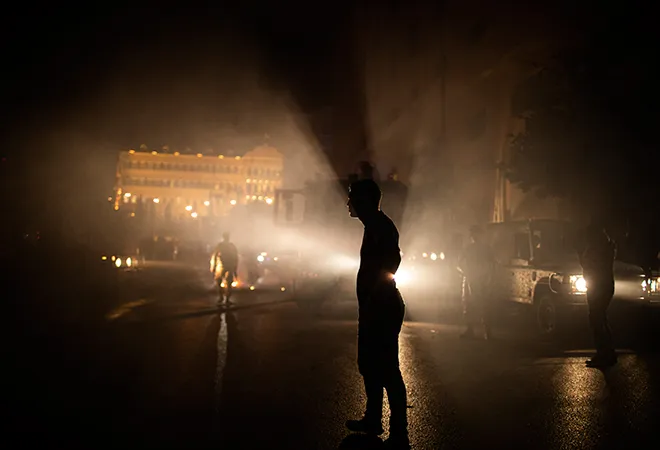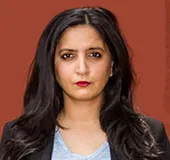-
CENTRES
Progammes & Centres
Location
The Lebanese fear that a minor incident could get out of hand and cause war, and tumult the country into complete chaos.

This article was written prior to the events of 4 August in Beirut, Lebanon.
Over the last two months, as Lebanon confronts its worst-ever economic crisis and people struggle to buy basic necessities, reports of Israeli jets hovering above the Lebanese cities have caused further anxiety.
The Lebanese live with an ever-looming threat of war with Israel and whilst they say no time is good to have a war, this is an especially bad time. The country has defaulted on its debt, its currency has plummeted by 80% and the $10 billion bailout from the International Monetary Fund is still awaited.
"The Lebanese live with an ever-looming threat of war with Israel and whilst they say no time is good to have a war, this is an especially bad time."
Amidst the economic collapse, tensions with Israel escalated late last month as Israel claimed it thwarted an incursion by Hezbollah across the blue line into what the Israelis call Har Dov, a six miles long and two miles deep strip of land at the point where Israel, Lebanon, and the Syrian Golan Heights meet. The Lebanese refer to the area as Shebaa farms occupied by Israel and rely on the UN peacekeepers to defend it. The Indian contingent, deputed near the territory, is also tasked with that mammoth responsibility.
But on 27 July, the Israeli Defense Forces
"Around midnight on 2 August — less than a week after the incident on Lebanon’s border, the Israeli army said it spotted a squad of four men planting an explosive on the security fence along the disputed border on Golan Heights in Syria and fired at them."
However, Hezbollah — an Iran-backed militia and political party which describes itself as a resistance force against Israel and was born in 1982 to repel Israelis from their country, denied the border incident. “The Israeli reports form an attempt to invent false and fake victories,” said Hezbollah in a statement. “The Islamic Resistance confirms that there was no clash or shooting from its side until now, but rather it was a one-sided shooting, due to the enemy’s fear, anxiety and tension.” But, it made sure to warn Israel that it would give a befitting and timely reply to the Israeli shelling in the border villages of Hebbariyah and Kfarshouba in Lebanon. And, added that the revenge for the killing of a key operative in Syria, “was coming.”
A few days before the border incident, Ali Kamel Mohsin, a young but prominent Hezbollah operative was killed in an Israeli strike on, reportedly, a store near Damascus airport used by Iran to stock ammunition. Israel has struck Syria over a hundred times in the last few years and says it has done so only to destroy Iranian capabilities. In fact, around midnight on 2 August — less than a week after the incident on Lebanon’s border, the Israeli army said it spotted a squad of four men planting an explosive on the security fence along the disputed border on Golan Heights in Syria and fired at them. Even though no group was named and the Syrian government did not react to the incident, it is well-known that Hezbollah and Iran’s military advisers call the shots in Southern Syria in Quneitra on the Golan Heights. Israel has been worried about an Iranian arc of influence- from Tehran through Iraq and Syria to Lebanon, as a mortal security threat to its existence. Iran and its allies, meanwhile, are the last force challenging Israel’s annexation of Palestinian lands and America’s pro-Israel policy.
Hezbollah is seen as a real challenger to Israel and portrays itself as such since it gave Israel a good fight back in 2006. The Lebanese worry that if tensions escalate, Lebanon will again be the theatre of conflict. They fear that a minor incident could get out of hand and cause war, and tumult the country into complete chaos.
"Hezbollah is seen as a real challenger to Israel and portrays itself as such since it gave Israel a good fight back in 2006. The Lebanese worry that if tensions escalate, Lebanon will again be the theatre of conflict."
The promised revenge for Ali Kamel Mohsin’s killing may turn out to be that spark. Hezbollah chief Hassan Nasrallah had repeatedly threatened Israel of an aggressive response were IDF to kill any of his men in Syria or in Lebanon. After Ali’s killing, Israel tried to avoid the conflagration by sending a message to Hezbollah through the UN that Ali's killing was unintended and the group must refrain from reacting. Hezbollah said ‘no’ and that it will avenge the killing. As a result, the Israeli army is on high alert on the border and the Lebanese are worried that their problems may have just compounded immeasurably.
Experts say the only consolation is that neither Israel nor Hezbollah want a war that would ensure mutual destruction and much of what comes from both sides is rhetoric for local consumption, to keep their support bases appeased. Moreover, if Hezbollah could stomach the assassination of Qasem Soleimani — the Iranian major general in the Islamic Revolutionary Guard Corps
However, in a foreboding tone, Hezbollah’s statement read, “There's always tomorrow.”
The views expressed above belong to the author(s). ORF research and analyses now available on Telegram! Click here to access our curated content — blogs, longforms and interviews.

Anchal Vohra was a Fellow at ORF. She writes on contemporary developments in West Asia and on foreign policy.
Read More +